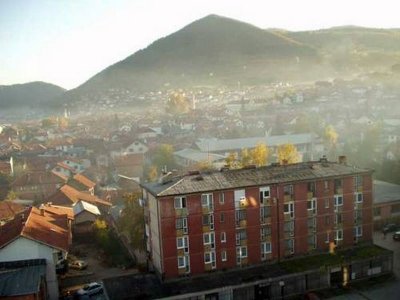 Practical and energetic, he is the type of leader Western diplomats and analysts are counting on to overcome animosities from the war.
Practical and energetic, he is the type of leader Western diplomats and analysts are counting on to overcome animosities from the war.
Serb mayor Zdravko Krsmanovic is trying to turn the eastern Bosnian town of Foca, best known for wartime atrocities and harbouring war crimes fugitives, into a centre for sports and tourism.
Practical and energetic, he is the type of leader Western diplomats and analysts are counting on to overcome animosities from the 1992-5 war that threaten Bosnia’s future as a multi-ethnic state.
Krsmanovic encourages the Muslim majority driven out during the war to return to the town and in 2006 persuaded Washington to lift sanctions imposed over suspicions it was harbouring fugitives like wartime Bosnian Serb leader Radovan Karadzic.
Now serving his second term as mayor, Krsmanovic said 12 indicted war crimes suspects from Foca, once dubbed Bosnia’s “black hole” by Western officials, had surrendered or been arrested in recent years.
He has built a sports centre and is trying to attract rafters to the spectacular river that runs nearby to help bring in badly needed money and jobs.
Unfortunately for the international officials seeking to scale back their supervisory role in Bosnia, he is an isolated figure in Bosnian Serb politics.
His support for the tripartite Muslim-Croat-Serb government in Sarajevo puts him at odds with most of his fellow Bosnian Serb leaders, who obstruct central state mechanisms.
“One can dislike it but we need the state to help us,” Krsmanovic said in a newly renovated municipal building in the tidy central square, a far cry from the killings, rapes and torture of Muslims that gave Foca its wartime reputation.
“You cannot keep the whole state hostage to your half-way politics,” Krsmanovic said, referring to Bosnian Serb Prime Minister Milorad Dodik’s threats of secession.
“If you want to secede and make your own country, that’s okay – declare independence, go to the borders and fight if you can, but don’t do it half way.”
SHOULD WE STAY OR GO?
Reform has been deadlocked in Bosnia, once part of Socialist Yugoslavia, due to rivalries between the two autonomous regions, the Muslim-Croat federation and the Serb Republic set up under the U.S.-brokered 1995 peace accord.
While Muslims and Croats aspire to a more centralised state, Bosnian Serbs want autonomy. The impasse has delayed the closure of the office of the international peace overseer since 2006.
This week the Peace Implementation Council (PIC), a body gathering major world powers and international agencies, met to inaugurate Austrian diplomat Valentin Inzko as Bosnia’s new peace envoy and extend the mandate of his office.
They had hoped to close the Office of the High Respresentative (OHR) entirely in the next few months but decided the country was still too unstable.
The Bosnian Serb ruling elite has repeatedly called for the closure of the OHR, saying Bosnia no longer needs the international supervision established after the end of the war.
Others disagree. Bojan Bajic, a Serb from the multi-ethnic Nasa Stranka party formed last year, says Bosnian Serb government policy has driven large numbers of people from eastern Bosnia, mainly to Serbia.
“The government does not have any development strategy for the eastern parts of the Serb Republic. It is only using its energy resources,” Bajic said by telephone from Rudo, a town on the border with Serbia.
Mayor Krsmanovic believes local government must do what national leaders have failed to achieve.
With socialist-era wood-processing industries and a nearby coal mine idle, about 41 percent of the 27,000-strong population in Foca are unemployed.
He has opened five high schools, where about 1,500 students enrol each year, built a sports centre and offered rafting on the Tara river, and sees links with Sarajevo as an important way to attract foreign tourists.
Political analyst Kurt Bassuener from the Democratization Policy Council said Krsmanovic’s approach contrasted sharply with the rhetoric from politicians fuelling inter-ethnic fear.
“It’s pretty revolutionary for the Serb Republic.”
 Eurasia Press & News
Eurasia Press & News


